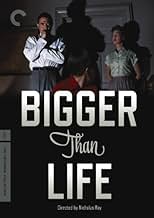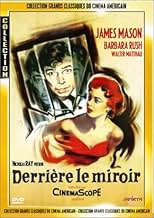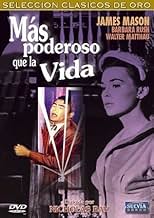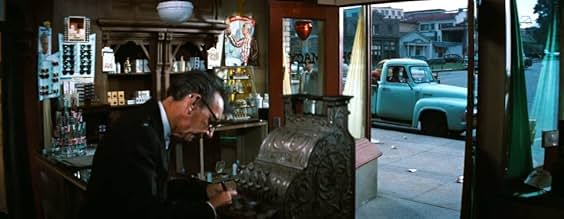IMDb RATING
7.4/10
8.6K
YOUR RATING
A seriously-ill schoolteacher becomes dependent on a miracle drug that begins to affect his sanity.A seriously-ill schoolteacher becomes dependent on a miracle drug that begins to affect his sanity.A seriously-ill schoolteacher becomes dependent on a miracle drug that begins to affect his sanity.
- Awards
- 2 nominations total
Robert F. Simon
- Dr. Norton
- (as Robert Simon)
David Bedell
- X-Ray Doctor
- (uncredited)
Gail Bonney
- Mother at PTA Meeting
- (uncredited)
Harold Bostwick
- Gentleman
- (uncredited)
Lovyss Bradley
- Churchgoer
- (uncredited)
Ann Cameron
- Churchgoer
- (uncredited)
Mary Carroll
- Mother at PTA Meeting
- (uncredited)
Virginia Carroll
- Mrs. Jones
- (uncredited)
Mary Carver
- Saleslady
- (uncredited)
Featured reviews
Bigger than Life (1956)
Tightly made, vividly acted film about a contemporary crisis--the use and abuse of a new "miracle" drug. Watching James Mason suffer, and then make other people suffer, and then face the final bells of his life, is half the movie. He's such a uniquely subtle and powerful actor (at the same time), always filled with poise and a whiff of kindly diffidence.
In a way, this is a precursor to the recent movie idea in "Limitless," where a drug makes you "bigger than life," though this is no fantasy. The drug here is cortisone, ingested orally. It had been understood as a natural (adrenal gland) steroid hormone and was manufactured (by Merck) and on the market by around 1950. And by 1956 when this movie came out it was considered a new kind of penicillin, but rather than just be an antibiotic, it seemed to just make you stronger against all kinds of ailments, especially those that involved swelling of some kind.
Director Nicholas Ray does his usual wonders with interpersonal drama and makes this quite believable, as well as dramatic, and Joe MacDonald does his usual wonders with the camera-work. The writing, too, is crisp and believable (both Ray and Mason helped with the screenplay). In all, it's a top shelf production and a great story.
But it fails somehow to be a great film, and I think the main reason is the hook to the plot, about the wonder drug, is a little too neatly packaged, with a few scenes that are almost like public service announcements. We sort of know before we are "supposed" to know that it's going to go bad--the clues go beyond foreshadowing--and so when we find out we are right, the edge is off of the narrative. Only the very end is left hanging, though you figure, with Merck keeping an eye on things, that events really can't go too wrong. According to Wikipedia, the American response at the time was shock and the movie did poorly (I guess because it looked like an attack on the nuclear family, such was the 1950s).
But the critics loved it then and like it now. A movie this well made is still a thrill to watch for all the small things--Walter Matthau in a caricatured side role as the good Uncle, the psychological effects as manifest in Mason, and even the glimpse into the attitude toward medicine at the time. I don't think it's a typical reaction to cortisone, however (from what I've read)--this is a particular case where some inherent manic-depression is triggered, and exaggerated. It would be interesting to see this re-calibrated and filmed again in modern times, but with the subtlety here, the destruction of an ordinary family without shameless excess.
Tightly made, vividly acted film about a contemporary crisis--the use and abuse of a new "miracle" drug. Watching James Mason suffer, and then make other people suffer, and then face the final bells of his life, is half the movie. He's such a uniquely subtle and powerful actor (at the same time), always filled with poise and a whiff of kindly diffidence.
In a way, this is a precursor to the recent movie idea in "Limitless," where a drug makes you "bigger than life," though this is no fantasy. The drug here is cortisone, ingested orally. It had been understood as a natural (adrenal gland) steroid hormone and was manufactured (by Merck) and on the market by around 1950. And by 1956 when this movie came out it was considered a new kind of penicillin, but rather than just be an antibiotic, it seemed to just make you stronger against all kinds of ailments, especially those that involved swelling of some kind.
Director Nicholas Ray does his usual wonders with interpersonal drama and makes this quite believable, as well as dramatic, and Joe MacDonald does his usual wonders with the camera-work. The writing, too, is crisp and believable (both Ray and Mason helped with the screenplay). In all, it's a top shelf production and a great story.
But it fails somehow to be a great film, and I think the main reason is the hook to the plot, about the wonder drug, is a little too neatly packaged, with a few scenes that are almost like public service announcements. We sort of know before we are "supposed" to know that it's going to go bad--the clues go beyond foreshadowing--and so when we find out we are right, the edge is off of the narrative. Only the very end is left hanging, though you figure, with Merck keeping an eye on things, that events really can't go too wrong. According to Wikipedia, the American response at the time was shock and the movie did poorly (I guess because it looked like an attack on the nuclear family, such was the 1950s).
But the critics loved it then and like it now. A movie this well made is still a thrill to watch for all the small things--Walter Matthau in a caricatured side role as the good Uncle, the psychological effects as manifest in Mason, and even the glimpse into the attitude toward medicine at the time. I don't think it's a typical reaction to cortisone, however (from what I've read)--this is a particular case where some inherent manic-depression is triggered, and exaggerated. It would be interesting to see this re-calibrated and filmed again in modern times, but with the subtlety here, the destruction of an ordinary family without shameless excess.
James Mason produced the movie, suggesting to me that it was he who got this very noncommercial property filmed and released. It's a top-notch cast directed by cult favorite Nicholas Ray, but the material is a decided downer despite the originality. There were several films out at the time dealing with drug addiction (e.g. Hatful of Rain, Man with the Golden Arm). This, however, is the only one I know dealing with addiction to a prescription drug, Cortisone. Since similar attachments have spread over the decades, the theme has come to anticipate a more general social problem. Thus, its relevance carries over even for today's audiences.
Mason plays Ed Avery, a high-school teacher and normal family man. I like the way the screenplay works in the fact that he can't support a family on a teacher's income, and so has a second job as a cabbie. As a result, his day is filled from dawn to dusk. Small wonder, then, that he begins suffering blackouts, which doctors diagnose as a rare arterial disorder. (It's not made clear what has caused the problem. Overwork? Genetics?) A new drug, Cortisone, is prescribed for an indefinite period of usage. Up to now, Ed has been a friendly, well-liked family man and co-worker. So it's a harrowing trajectory to watch him go through increasingly intense periods of mental breakdown as a side effect of the new drug.
It's an excruciating descent into delusions of grandeur and megalomania, with few efforts at softening the agony. As the delusions mount, Ed abusively lectures a PTA meeting, berates and condemns his wife (Rush), becomes a Nazi-like taskmaster to his son (Olsen), and even tries to re-enact Abraham's sacrifice of son Isaac. Now, there were many so-called scary B- movies out at the time. But none, I believe, are any scarier than Mason's portrayal of the ravaged high-school teacher. Probably half the audience went home to check their medicine chest.
The only fault I find is with wife Lou's behavior. In my book, she's too passive to be believable in the face of the growing ordeal, especially as her son is affected. Ray brings out an unusual but expected degree of intensity in Mason's performance, with another of his trademarks centering on the action around the family staircase, perhaps symbolizing the mounting madness. Also, I wouldn't be surprised that Ray and Mason took a cut in pay to get the project made. The only concession to commercialism that I can spot is the expected 1950's ending, which nonetheless is more a relief than a disappointmenta tribute, I think, to the caliber of what's there on screen. Anyway, the movie comes across as an unusual and searing melodrama, prescient for its time.
Mason plays Ed Avery, a high-school teacher and normal family man. I like the way the screenplay works in the fact that he can't support a family on a teacher's income, and so has a second job as a cabbie. As a result, his day is filled from dawn to dusk. Small wonder, then, that he begins suffering blackouts, which doctors diagnose as a rare arterial disorder. (It's not made clear what has caused the problem. Overwork? Genetics?) A new drug, Cortisone, is prescribed for an indefinite period of usage. Up to now, Ed has been a friendly, well-liked family man and co-worker. So it's a harrowing trajectory to watch him go through increasingly intense periods of mental breakdown as a side effect of the new drug.
It's an excruciating descent into delusions of grandeur and megalomania, with few efforts at softening the agony. As the delusions mount, Ed abusively lectures a PTA meeting, berates and condemns his wife (Rush), becomes a Nazi-like taskmaster to his son (Olsen), and even tries to re-enact Abraham's sacrifice of son Isaac. Now, there were many so-called scary B- movies out at the time. But none, I believe, are any scarier than Mason's portrayal of the ravaged high-school teacher. Probably half the audience went home to check their medicine chest.
The only fault I find is with wife Lou's behavior. In my book, she's too passive to be believable in the face of the growing ordeal, especially as her son is affected. Ray brings out an unusual but expected degree of intensity in Mason's performance, with another of his trademarks centering on the action around the family staircase, perhaps symbolizing the mounting madness. Also, I wouldn't be surprised that Ray and Mason took a cut in pay to get the project made. The only concession to commercialism that I can spot is the expected 1950's ending, which nonetheless is more a relief than a disappointmenta tribute, I think, to the caliber of what's there on screen. Anyway, the movie comes across as an unusual and searing melodrama, prescient for its time.
Ed Avery (James Mason) is a school teacher with loving wife Lou (Barbara Rush) and son Richie. Pat Wade and Wally Gibbs (Walter Matthau) are his friends fellow teachers. He starts blacking out from terrible pains. Hospital doctors diagnose him with a rare disease and give him experimental cortisone treatment. He makes a remarkable recovery and given cortisone tablets to take. His personality starts to change and he begins to abuse the pills.
The subject matter of prescription drug abuse is prescient although the madness is sometimes reminiscent of the old educational films of the dangers of marijuana. The 50's nuclear family does keep this mired in an old fashion style. Nevertheless, it is very admirable to see this issue tackled. The widescreen CinemaScope does something interesting to the interior scenes. When the walls on both sides of the room can be seen, it pulls the audience inside the rooms. The characters and their story becomes even more immediate.
The subject matter of prescription drug abuse is prescient although the madness is sometimes reminiscent of the old educational films of the dangers of marijuana. The 50's nuclear family does keep this mired in an old fashion style. Nevertheless, it is very admirable to see this issue tackled. The widescreen CinemaScope does something interesting to the interior scenes. When the walls on both sides of the room can be seen, it pulls the audience inside the rooms. The characters and their story becomes even more immediate.
James Mason becomes "Bigger than Life" in this 1956 Nicholas Ray film that also stars Barbara Rush and Walter Matthau. Mason plays Ed Avery, a schoolteacher who also is a part-time cab dispatcher. He is suffering from severe spasms that are getting worse.
Ed learns that he has a terminal illness that perhaps can be cured with a steroid, cortisone. He is helped, but he also begins to suffer from mood swings and depression and, as he takes more and more, veers completely out of control. Barbara Rush plays his suffering wife, and Walter Matthau is a family friend and coworker.
I actually had a family member who went into profound depressions because of continuing to take black market cortisone, so this film resonated with me. Mason, who produced the film, is terrifying. Barbara Rush is very good, though her character puts up with an awful lot before she makes a move. Matthau is good in a supporting role, but roles showcasing his true strengths as an actor were a few years away.
This is much more than a cautionary tale about steroids, which need to be taken and tapered off very carefully. In his cortisone-induced mindset, Ed Avery spouts off on the problems in society, very unusual in the repressed '50s. His ideas are a tad over the top, but there's a good kernel in them. Ray always did well with a rebellious mindset.
Ed learns that he has a terminal illness that perhaps can be cured with a steroid, cortisone. He is helped, but he also begins to suffer from mood swings and depression and, as he takes more and more, veers completely out of control. Barbara Rush plays his suffering wife, and Walter Matthau is a family friend and coworker.
I actually had a family member who went into profound depressions because of continuing to take black market cortisone, so this film resonated with me. Mason, who produced the film, is terrifying. Barbara Rush is very good, though her character puts up with an awful lot before she makes a move. Matthau is good in a supporting role, but roles showcasing his true strengths as an actor were a few years away.
This is much more than a cautionary tale about steroids, which need to be taken and tapered off very carefully. In his cortisone-induced mindset, Ed Avery spouts off on the problems in society, very unusual in the repressed '50s. His ideas are a tad over the top, but there's a good kernel in them. Ray always did well with a rebellious mindset.
This film, much like the melodramas of Douglas Sirk, has far more going on than meets the eye. James Mason's character, after getting whacked out of Cortizone (a "Miracle Drug") indeed becomes hysterical and abusive. But he was made ill in the first place by the strain caused his intensely driven lifestyle, where he kept two jobs to finance his family's social and financial ascent.
What the viewer has to watch for is what his character says during his cortizone-induced delusions. His criticisms of his wife, kid, PTA and society in general are over-the-top, but essentially valid. It's a classic narrative device: by allowing a main character a way out of societal responsibility and place (In this case, being bombed on Cortizone), he is allowed to comment on and criticize American society directly without actually threatening the status quo. and in the case of 1950s America, that's a monolithic status quo to criticize.
What the viewer has to watch for is what his character says during his cortizone-induced delusions. His criticisms of his wife, kid, PTA and society in general are over-the-top, but essentially valid. It's a classic narrative device: by allowing a main character a way out of societal responsibility and place (In this case, being bombed on Cortizone), he is allowed to comment on and criticize American society directly without actually threatening the status quo. and in the case of 1950s America, that's a monolithic status quo to criticize.
Did you know
- TriviaThe main manufacturers of cortisone at the time, Merck in the US and Glaxo in the UK, were worried about the impact of this film on the public and their willingness to take the drug if prescribed by their physician. However, by the time of this film's release, newer and better formulations of the drug, along with greater knowledge of its uses and limitations had reduced (but not eliminated) the side-effects experienced by Ed in this film.
- GoofsWhen Ed has a barium X-ray, the image of the swallowed fluid is anatomically inaccurate. The fluid falls straight down to an extremely large "stomach" in his groin area.
- How long is Bigger Than Life?Powered by Alexa
Details
- Release date
- Country of origin
- Languages
- Also known as
- Bigger Than Life
- Filming locations
- Production company
- See more company credits at IMDbPro
Box office
- Budget
- $1,000,000 (estimated)
- Runtime
- 1h 35m(95 min)
- Color
- Aspect ratio
- 2.55 : 1
Contribute to this page
Suggest an edit or add missing content































